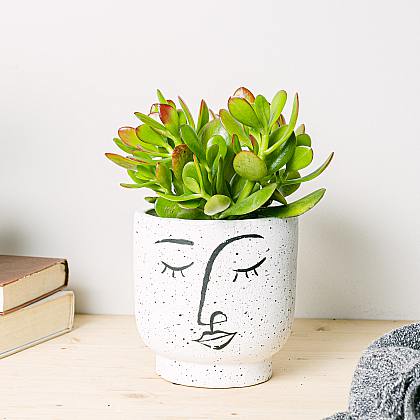Practical tips to take care of your houseplants and improve their energy according to Feng Shui
Feng Shui is an ancient Chinese practice that seeks to harmonize the energies of a space to improve the quality of life of those who inhabit it
Feng Shui is an ancient Chinese practice that seeks to harmonize the energies of a space to improve the quality of life of those who inhabit it. This philosophy can also be applied to our houseplants, as they are also energy carriers. In this article, we'll explore how Feng Shui can help your plants, from the right choice to care and ideal placement. In addition, we will discover how the colors and materials used in decoration can influence the energy of your plants. Join us to discover practical tips and additional benefits of Feng Shui for your home.
What is Feng Shui and how can it help your plants?
Feng Shui is an ancient Chinese system that seeks to harmonize the energy of spaces to promote well-being and prosperity. In the case of houseplants, Feng Shui can be a great help in creating a balanced environment full of positive energy. Feng Shui considers plants to be carriers of chi, the vital energy, and can influence the flow of energy in our home. By choosing houseplants according to the principles of Feng Shui, you seek to create a balance between the five elements (wood, fire, earth, metal and water) to promote good energy in the space. In addition, some plants are considered especially auspicious in Feng Shui due to their ability to purify the air and attract prosperity and good luck. These plants include lucky bamboo, peace lily, and penca money. By incorporating Feng Shui into the care of our houseplants, we can improve their health and vitality, as well as create a harmonious environment full of positive energy in our home.
The choice of houseplants according to Feng Shui
According to Feng Shui, the choice of houseplants is crucial to ensure good energy in the home. Some plants are considered particularly auspicious because they have healing and air-purifying properties, while others can have negative effects if placed in inappropriate places. The money tree, for example, is a very popular plant in Feng Shui because it is believed to attract prosperity and wealth. Lucky bamboo is another recommended plant because it symbolizes endurance and strength. In general, it is recommended to choose plants with round, soft leaves, as these forms are believed to have a calming and harmonizing effect on the environment. On the other hand, having plants with spiky or prickly leaves should be avoided, as they can create aggressive and hostile energy. Additionally, it's important to consider the amount of natural light available in each room when choosing the right plants. For example, tropical plants need a lot of light and humidity, while others such as Sansevieria or ZZ Plant can survive in low light. In summary, when choosing houseplants according to Feng Shui, one should consider their symbolic and aesthetic properties, as well as their light and water needs to ensure positive energy in the home.
How to Care for Your Houseplants to Improve Their Energy
How to Care for Your Houseplants to Improve Their Energy
Taking proper care of your houseplants is essential to improve their energy and maintain a positive balance in your home according to the principles of Feng Shui. First, it's important to pay attention to each plant's individual needs, including the amount of sunlight, water, and nutrients they require. Make sure you provide them with the right amount of water, avoiding both over- and under-watering. Also, keep a regular check on pests and diseases that may affect your plants, using natural and environmentally friendly methods for their treatment.
Another aspect to consider is the choice of appropriate pots and containers for your plants. According to Feng Shui, it is recommended to use clay or ceramic pots, as they allow better circulation of energy and prevent water from stagnating. It is also advisable to use good quality organic soil to provide your plants with the necessary nutrients.
Also, don't forget to regularly prune your houseplants to promote healthy growth and remove dead or diseased parts. This will also help maintain a steady flow of energy in your home. Finally, consider the ideal location of your plants within your home. Feng Shui suggests placing them in strategic places where they can receive enough natural light and air circulation, avoiding placing them near doors or windows.
By following these practical tips to care for your houseplants according to Feng Shui, you will be able to improve their energy and create a harmonious and balanced environment in your home.
The ideal location of plants according to Feng Shui
The ideal placement of plants according to Feng Shui is a key aspect of ensuring positive energy in your home. According to this ancient Chinese practice, each area of your home is associated with a specific element and placing plants in the right location can help balance and harmonize that energy. For example, houseplants with rounded, soft leaves are considered ideal for placing in areas of the house associated with the wood element, such as the east or southeast. These plants can help promote growth and vitality in those spaces. On the other hand, plants with spiky or spiny leaves are better suited for areas associated with the fire element, such as the south. These plants can help stimulate passion and creativity in those spaces. Additionally, it's important to consider the direction and flow of energy within your home when placing plants. For example, placing a plant near an open window can allow fresh, revitalizing energy into your home. Similarly, avoiding placing plants in areas where clutter or energy stagnation accumulates, such as dark corners or unattended corners, can help maintain a positive energy flow in your home. In short, by considering the ideal placement of your plants according to Feng Shui, you will be creating a harmonious and balanced environment that promotes positive and beneficial energy for you and your home.
The use of colors and materials in the decoration of your plants
Using colors and materials in your plant décor can be a powerful tool to improve the energy in your home. According to Feng Shui, colors have a significant impact on the environment and can influence our emotions and mood. Therefore, it is important to choose the right colors for your houseplant décor. The colors that are recommended are green and brown tones, which represent nature and the earth. Complementary colors such as white or yellow can also be used to highlight the plants.
In addition, the materials used in the decoration are also important. It is recommended to use natural materials such as wood, stone or clay for plant pots. These materials help maintain a connection to nature and provide a solid foundation for plants.
It is important to note that synthetic materials such as plastic or metal can generate negative energy and are not recommended for the decoration of your plants according to Feng Shui.
In short, by choosing the right colors and materials for your houseplant décor, you can enhance the positive energy in your home. By maintaining a connection with nature and using natural materials, you can create a harmonious and balanced environment in your home.
The Importance of Regular Plant Maintenance
The importance of regular maintenance of your plants is crucial to ensure their health and positive energy. Just like any living thing, plants need care and attention to grow strong and healthy. Proper maintenance includes watering them regularly, fertilizing them as needed, pruning them when necessary, and removing any dead leaves or branches. In addition, it is important to pay attention to the signals that plants give us to detect any problems in time. For example, if the leaves begin to wilt or yellow, it may be a sign of a lack of water or nutrients. If a problem is detected, it's important to address it immediately to prevent it from spreading and causing further damage.
Regular maintenance can also help prevent Feng Shui-related problems. If plants are not properly cared for, they can lose their positive energy and negatively affect the energy in your home. Sick or neglected plants can attract negative energies and create an unhealthy environment in your home. Therefore, it's important to regularly take time to care for your houseplants and keep them in their best condition.
In short, regular maintenance of your houseplants is not only important to ensure their health and growth, but also to maintain a positive energy in your home. Pay attention to your plants' needs and make sure you address any issues in time to prevent further damage. With proper care, your plants can be a source of beauty and positive energy in your home.
Additional benefits of Feng Shui for your home
Additional benefits of Feng Shui for your home
Not only does Feng Shui have benefits for your houseplants, but it can also improve the overall energy and ambiance of your home. One of the most prominent advantages is the creation of a harmonious and balanced space, which contributes to a sense of peace and tranquility. By applying the principles of Feng Shui in the decoration and distribution of your furniture, you can achieve a better circulation of energy, which translates into a healthier environment conducive to well-being.
Another important benefit is increased productivity and concentration. By creating a balanced environment, with the correct placement of furniture and good natural lighting, you can promote concentration and focus on daily tasks. This is especially relevant if you work from home or have a space dedicated to studying.
In addition, Feng Shui can help you improve the quality of your sleep. By placing the bed in the right position and using colors and materials that promote relaxation, you can create an environment conducive to rest. This will allow you to enjoy a restful sleep and wake up with greater energy and vitality.
In short, Feng Shui offers additional benefits for your home beyond improving the energy of your houseplants. It can contribute to creating a harmonious environment, promoting concentration and increasing productivity, as well as improving the quality of sleep. Integrating Feng Shui principles into your home can be a great way to create a welcoming space conducive to physical and emotional well-being.
In short, Feng Shui can be a very useful tool to improve the energy of our indoor plants and, therefore, of our home. By choosing the right plants, caring for them correctly and placing them in the ideal places according to this age-old philosophy, we can create a harmonious and positive environment in our home. In addition, the use of appropriate colors and materials in the decoration of our plants can also contribute to improving their energy. However, we must not forget that regular maintenance of our plants is essential for their health and well-being. In this sense, Feng Shui can be an interesting complement but it should not be seen as the only solution. As a final thought, what other practices or tips do you know to keep your houseplants healthy and with good energy?


